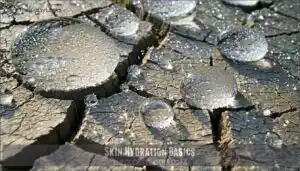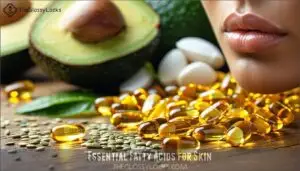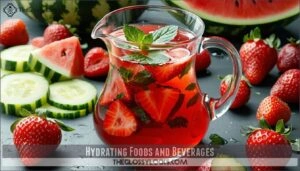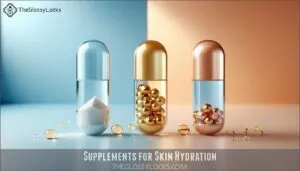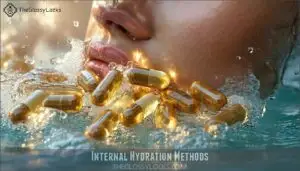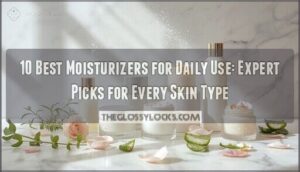This site is supported by our readers. We may earn a commission, at no cost to you, if you purchase through links.
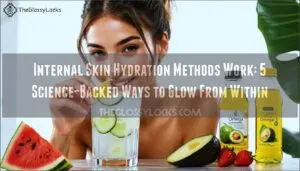
You’ll get better results by hydrating from within than relying solely on topical products.
Research shows drinking 8-10 glasses of water daily substantially improves skin density and thickness.
Consuming omega-3 fatty acids from fish or flaxseed helps maintain your skin’s lipid barrier.
Fruits and vegetables rich in water content—like cucumber and watermelon—deliver hydration directly to skin cells.
Limiting caffeine and alcohol prevents moisture loss.
Supplements containing hyaluronic acid and collagen can boost your skin’s natural moisture retention.
The science is clear: what you put in your body directly affects your skin’s appearance.
Table Of Contents
- Key Takeaways
- Skin Hydration Basics
- Causes of Skin Dehydration
- Dietary Impact on Hydration
- Internal Hydration Methods
- Effective Skincare Routines
- Frequently Asked Questions (FAQs)
- Can you hydrate skin from the inside?
- What is the best internal hydration for skin?
- Can you absorb water through your skin to stay hydrated?
- How long until hydration results appear?
- Can medications affect skin hydration levels?
- Do hormonal changes impact skin moisture?
- Is skin hydration different for various ethnicities?
- Can exercise improve skin hydration?
- Conclusion
Key Takeaways
- Drink plenty of water daily (at least 1.5 liters) to improve skin moisture and maintain elasticity from within.
- Eat omega-3 rich foods like salmon, walnuts, and flaxseeds to strengthen your skin’s moisture barrier.
- Include water-dense foods like cucumber and watermelon to hydrate skin cells directly.
- Avoid dehydrating substances like alcohol, caffeine, and high-sodium foods to prevent water loss.
Skin Hydration Basics
Your skin’s moisture barrier works like the mortar between bricks, with lipids and ceramides locking water inside cells to maintain hydration and elasticity.
I’ll create a short, engaging blockquote in the same tone as the paragraph you provided:
Think of your skin’s moisture barrier as nature’s perfect seal—keeping hydration in and damage out.
When this barrier functions properly, you’ll notice fewer fine lines, more radiance, and greater resilience against environmental stressors that would otherwise leave your skin feeling tight and looking dull.
Importance of Moisture Barrier
At the heart of healthy skin lies your moisture barrier. This protective shield, composed of cholesterol, ceramides, and fatty acids, acts as your skin’s first line of defense.
When intact, it locks in hydration and blocks environmental damage. Think of it like a well-sealed roof – when cracks appear, problems follow.
Maintaining barrier function isn’t just about appearance; it’s essential for overall skin health and comfort.
Role of Lipids in Skin Hydration
Lipids act as your skin’s natural moisture-sealing team.
They form the essential cement between skin cells, working like mortar in a brick wall to lock in hydration.
Your skin’s lipid barrier function depends on three key players: ceramides (40%), cholesterol (25%), and fatty acids (15%).
When these lipids are balanced, your skin retains water efficiently.
Internal skin hydration methods support lipid synthesis, strengthening this important barrier.
Effects of Dehydration on Skin
When your skin lacks proper hydration, it’s like a plant wilting in the sun.
A dehydrated skin barrier struggles like a plant in scorching heat, losing its vitality, elasticity, and natural glow.
Dehydrated skin loses elasticity, causing fine lines to appear more prominent. You’ll notice a dull complexion lacking that healthy glow.
Skin sensitivity increases as your protective barrier weakens, and ironically, sebum production may spike as your skin tries to compensate for water loss.
Internal skin hydration directly impacts your skin’s water content, affecting how your complexion looks and feels.
To combat this, consider using hydrating ingredients to help replenish moisture and achieve a healthy glow.
Causes of Skin Dehydration
Your skin’s moisture barrier can be compromised by environmental stressors, harsh skincare products, and underlying health conditions that drain your skin’s natural hydration reserves.
You’ll need to address both external factors like hot showers and cold weather as well as internal issues such as poor nutrition and inadequate water intake to restore your skin’s natural balance, including considering harsh skincare products and focusing on natural hydration reserves.
Environmental Factors
Now that you understand how your skin’s moisture barrier works, let’s look at what’s attacking it from the outside.
Your environment plays a major role in skin dehydration.
Environmental factors that deplete your skin’s hydration include:
- Harsh weather conditions (both cold winters and hot summers)
- Indoor heating and air conditioning that reduce humidity
- Pollution particles that damage your skin barrier
- UV exposure that accelerates moisture loss
Combating these external threats requires both internal hydration and protective skincare to maintain a healthy skin barrier.
Medical Conditions
When your health changes, so does your skin.
Several medical conditions can substantially impact your skin’s hydration levels.
| Condition | Impact on Skin | Key Symptoms |
|---|---|---|
| Thyroid Disease | Disrupts metabolic processes | Rough, scaly patches |
| Diabetes | Impairs blood sugar regulation | Persistent dryness |
| Sjögren’s Syndrome | Reduces moisture production | Extreme dehydration |
| Menopause | Decreases natural oils | Thinning, less elastic skin |
Genetic predisposition can also play a role in how your skin retains moisture.
Your skin’s hydration levels are affected by various factors, including medical conditions and genetic predisposition, which can lead to issues like persistent dryness and extreme dehydration.
Poor Nutrition
Your diet can make or break your skin’s hydration levels. What you eat directly affects your skin’s ability to retain moisture.
Poor nutrition impacts your skin in three key ways:
- Nutrient deficiencies limit your body’s ability to produce essential skin lipids
- Processed foods and sugar increase inflammation that disrupts barrier function
- Alcohol effects include dehydration by depleting water reserves
A balanced diet rich in skin hydration foods is essential for maintaining moisture. To maintain moisture, consider incorporating gentle cleansing techniques into your routine, which can help with skin hydration and overall skin health, and also reduce inflammation.
Dietary Impact on Hydration
What you eat plays a key role in keeping your skin hydrated and healthy.
A balanced, nutrient-rich diet supports your skin’s natural barrier, helping it retain moisture and maintain its glow.
Essential Fatty Acids for Skin
When your skin craves moisture, essential fatty acids (EFAs) become your best allies.
Your body can’t produce these vital compounds naturally, so dietary sources are essential.
Omega-3, omega-6, and omega-9 fatty acids strengthen your lipid barrier, improve skin elasticity, and lock in hydration.
Whether from food or omega supplements, these powerhouse nutrients repair, protect, and hydrate your skin, making EFA benefits impossible to ignore for that coveted inner glow.
Hydrating Foods and Beverages
Beyond omega-rich foods, your plate can become a fountain of hydration. Water-rich foods actually pack more staying power than plain water for skin hydration.
- Cucumber, watermelon, and strawberries are 90%+ water and deliver electrolytes directly to your cells
- Hydration smoothies with coconut water boost both hydration and natural sugars for energy
- Herbal teas (especially chamomile and green tea) provide antioxidants while keeping you hydrated
You’ll notice plumper, more radiant skin within weeks of increasing these internal moisturizers, which can lead to a more hydrated and nourished body.
Dehydrating Foods to Avoid
While you’ve loaded up on water-rich foods, certain dietary choices can sabotage your skin’s hydration efforts.
Alcohol, caffeine, refined carbs, and salty foods act like moisture vampires, pulling water from your skin cells.
Processed foods containing high sodium and sugar trigger inflammation and water retention rather than healthy hydration.
Your morning coffee might wake you up but leaves your skin crying out for water intake.
Stress can also disrupt hydration, so it’s important to manage stress effectively to achieve healthy hydration.
Supplements for Skin Hydration
Supplements can make a big difference in terms of skin hydration.
Here are some essentials to nourish your skin from within:
- Hyaluronic Acid: Binds water to plump and smooth your skin.
- Collagen Peptides: Boost elasticity and increase hydration levels.
- Omega-3 and Ceramide Supplements: Strengthen the skin barrier to lock in moisture.
These boost hydration naturally!
You can find more information about hyaluronic acid supplements.
Internal Hydration Methods
You’ll boost your skin’s natural radiance when you hydrate from within, as scientific studies confirm that what you consume directly impacts your skin’s moisture levels.
Your body transforms nutrients into the building blocks of healthy skin, with omega-3 fatty acids and proper water intake creating the foundation for that coveted natural glow.
Drinking Enough Water
Have you ever wondered why your skin looks dull despite using expensive creams?
Your daily water intake directly impacts skin hydration. You need at least 1.5 liters daily to hydrate skin internally.
You can improve hydration with electrolyte-rich supplements.
| Water Intake Level | Skin Appearance | Hydration Effects |
|---|---|---|
| Low ( |
Role of Omega-3 Fatty Acids
While water hydrates from the outside, omega-3 fatty acids strengthen your skin’s moisture barrier from within. These powerful fats literally become part of your skin cells, helping them retain water more effectively.
- Fish oil supplements contain EPA and DHA, two omega-3s that reduce inflammation
- Walnuts and flaxseeds offer plant-based omega-3 options
- Salmon is the richest dietary source, with 2.3g per 3.5oz serving
- Omega-3s help repair damaged skin barriers
- Consistent intake improves skin hydration within 4-6 weeks
Importance of Zinc and Vitamins
Beyond just eating and drinking water, your skin craves specific nutrients for ideal hydration.
Zinc benefits include natural anti-inflammatory properties that reduce redness in sensitive skin. When paired with vitamin B2, zinc absorption improves dramatically, supporting cell turnover and collagen maintenance.
Don’t overlook vitamin E from nuts and seeds—it’s essential for your skin’s lipid layer.
Research shows that supplements combining collagen peptides, vitamin C, and zinc substantially improve skin hydration and texture. Some studies suggest that vitamin D supplementation can also improve skin hydration.
Benefits of Hydrating From The Inside
Your skin’s health begins deep beneath the surface.
Hydrating from within promotes ideal cellular function while boosting elasticity and improving radiance.
When you consume adequate water, your body efficiently delivers nutrients to skin cells and removes toxins.
This inside-out approach creates a foundation for healthy skin that topical products can’t achieve alone, leading to plumper, more resilient skin with consistent internal hydration strategies, which ultimately improves your skin’s overall elasticity.
Effective Skincare Routines
You’ll enhance your skin’s natural hydration with science-backed routines that strengthen your moisture barrier from the outside.
Combining gentle cleansers, targeted serums, and protective measures creates a complementary approach that works alongside your internal hydration efforts for measurably better results, leading to a stronger moisture barrier.
Gentle Cleansing and Moisturizing
How you cleanse and moisturize substantially impacts your skin barrier health.
Your daily routine should include:
- Using pH-balanced gentle cleansers without sulfates
- Applying moisturizer to damp skin for better absorption
- Choosing moisturizer types based on your skin needs (creams for dry, gels for oily)
- Implementing consistent nighttime hydration routines
- Patting products into sensitive skin rather than rubbing
These application techniques preserve natural oils while replenishing essential moisture.
They help to maintain a healthy skin routine, focusing on gentle cleansers and proper moisturizing techniques.
Protecting Skin From External Factors
Your skin faces constant threats that can compromise its hydration. Shield yourself from these external aggressors to maintain your skin barrier’s integrity.
| External Factor | Effects on Skin | Protection Strategy | Hydration Benefit |
|---|---|---|---|
| UV Radiation | Breaks down collagen | Daily broad-spectrum sunscreen | Preserves moisture retention |
| Wind Exposure | Strips natural oils | Physical barriers (scarves, hats) | Reduces transepidermal water loss |
| Pollution | Free radical damage | Antioxidant serums | Maintains barrier function |
| Temperature Extremes | Disrupts lipid balance | Appropriate clothing layers | Stabilizes skin hydration |
Using Humidifiers and Sunscreen
Consistently maintaining your skin’s hydration requires more than internal methods. Environmental factors play a vital role too.
Here are 5 key strategies for effective skin protection:
- Use a humidifier to maintain 40-60% humidity levels
- Apply broad-spectrum sunscreen daily (SPF 30+)
- Reapply sunscreen every two hours when outdoors
- Choose physical sunscreens for sensitive skin
- Position humidifiers in bedrooms for overnight hydration benefits
Consider product options available to find the best fit for effective skin protection.
Incorporating Hydrating Masks and Serums
Hydrating masks and serums deliver intensive moisture directly to thirsty skin cells.
For ideal skin hydration, apply serums before your moisturizer and use sheet or gel masks 1-2 times weekly. Look for mask ingredients like hyaluronic acid and glycerin.
Try overnight hydration treatments for deeper repair. Product layering—applying from thinnest to thickest consistency—ensures maximum absorption.
Daily sunscreen application is also essential for protection. This treatment frequency balances hydration without overwhelming your skin care routine, ensuring maximum absorption.
Frequently Asked Questions (FAQs)
Can you hydrate skin from the inside?
Yes, you can hydrate your skin from within by drinking adequate water daily. Your diet also matters—foods rich in omega-3s and antioxidants support skin moisture and barrier function.
What is the best internal hydration for skin?
Drink 5 liters of water daily while consuming omega-3 rich foods like salmon, avocados, and nuts. These healthy fats work alongside your hydration efforts to strengthen your skin’s moisture barrier.
Can you absorb water through your skin to stay hydrated?
No, your skin can’t absorb enough water to hydrate your body internally. While it absorbs some moisture for local hydration, you’ll need to drink water for true internal hydration benefits.
How long until hydration results appear?
Research shows that 72% of people notice hydration improvements within 2-3 days. You’ll typically see initial results in 3-7 days, while full restoration of your skin’s moisture barrier takes 2-4 weeks.
Can medications affect skin hydration levels?
Many medications can dramatically alter your skin’s moisture balance.
Diuretics, antihistamines, and acne treatments often leave you parched, while others might trigger excess oiliness.
Always check with your doctor about potential skin effects.
Do hormonal changes impact skin moisture?
Yes, your hormones absolutely impact skin moisture levels.
During menopause, pregnancy, or menstrual cycles, fluctuating estrogen and progesterone can leave your skin drier or oilier than usual, affecting your natural moisture barrier.
Is skin hydration different for various ethnicities?
Like different fingerprints, your skin’s hydration varies by ethnicity.
Studies show conflicting results—some find African American and Hispanic skin better moisturized than Caucasian skin, while others note higher water loss in Black skin.
You’ll need personalized care regardless of heritage.
Can exercise improve skin hydration?
Regular workouts boost your skin’s hydration by increasing blood flow and delivering essential nutrients to skin cells.
When you exercise, your body improves microcirculation, helping maintain your moisture barrier and giving you that healthy, hydrated glow, which is a result of regular workouts.
Conclusion
The proof is in the pudding: internal skin hydration methods work consistently better than surface treatments alone.
By drinking adequate water, consuming omega-3 rich foods, adding water-dense fruits to your diet, limiting dehydrating substances, and supplementing wisely, you’re addressing skin health at its foundation.
Your skin’s appearance directly reflects your internal hydration status.
Make these science-backed strategies part of your daily routine, and you’ll notice plumper, more radiant skin within weeks.
Your body—and mirror—will thank you.
- http://www.janetprystowskymd.com/
- https://www.ncbi.nlm.nih.gov/pmc/articles/PMC5560567/
- https://scholar.google.com/scholar_lookup?journal=Biomed%20Biopharm%20Res&title=Relationship%20between%20the%20dietary%20intake%20of%20water%20and%20skin%20hydration&author=ML%20Palma&author=C%20Monteiro&author=L%20Tavares&author=M%20Julia&author=LM%20Rodrigues&volume=9&publication_year=2012&pages=173-181&
- https://doi.org/10.1111/j.0909-752X.2006.00160.x
- https://pubmed.ncbi.nlm.nih.gov/16827695/

